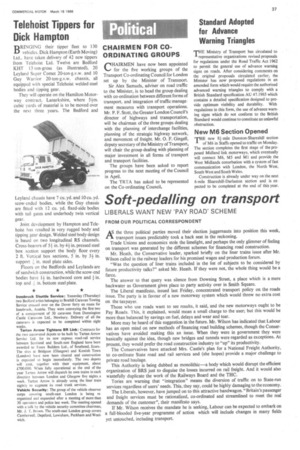Soft-pedalling on transport
Page 39

If you've noticed an error in this article please click here to report it so we can fix it.
LIBERALS WANT NEW 'PAY ROAD' SCHEME
FROM OUR POLITICAL CORRESPONDENT
Athe three political parties moved their election juggernauts into position this week, transport issues predictably took a back seat in the reckoning. Trade Unions and economics stole the limelight, and perhaps the only glimmer of feeling on transport was generated by the different schemes for financing road construction.
Mr. Heath, the Conservative leader, sparked briefly on the liner trains issue after Mr. Wilson called in the railway leaders for his promised wages and production forum.
"Was the question of liner trains included in the list of subjects to be considered by future productivity talks?" asked Mr. Heath. If they were not, the whole thing would be a farce.
The answer to that query was silence from Downing Street, a place which is a mere backwater as Government gives place to party activity over in Smith Square.
The Liberal manifesto, issued last Friday, concentrated transport policy on the roads issue. The party is in favour of a new motorway system which would throw no extra cost on the taxpayer.
Those who use roads want to see results, it said, and the new motorways ought to be Pay Roads. This, it explained, would mean a small charge to the user; but this would be more than balanced by savings on fuel, delays and wear and tear.
More may be heard of this suggestion in the future. Mr. Wilson has indicated that Labour has an open mind on new methods of financing road building schemes, though the Conservatives have avoided making this an issue. When they were in government they were basically against the idea, though new bridges and tunnels were regarded as exceptions. At present, they would prefer the road construction industry to "up" its productivity.
The Conservatives have attacked Mrs. Castle's plan for a National Freight Authority, to co-ordinate State road and rail services and (she hopes) provide a major challenge to private road haulage.
This Authority is being dubbed as monolithic—a body which would disrupt the efficient organization of BRS just to disguise the losses incurred on rail freight. And it would also wastefully duplicate the work of the Railways Board and the THC.
Tories are warning that "integration" means the diversion of traffic on to State-run services regardless of users' needs. This, they say, could be highly damaging to the economy.
The Liberals, however, have jumped on to this attractive bandwagon. "Britain's passenger and freight services must be rationalized, co-ordinated and streamlined to meet the real demands of the customer", their manifesto says.
If Mr. Wilson receives the mandate he is seeking, Labour can be expected to embark on a full-blooded five-year programme of action which will include changes in many fields yet untouched, including transport.




































































































































































